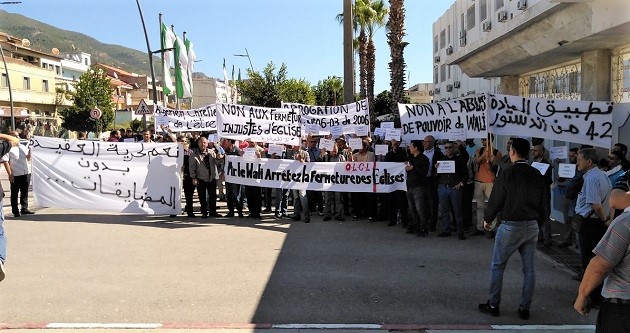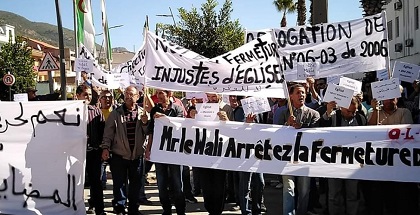Algerian Christians rally for “freedom of worship without intimidation”
Peaceful demonstrations call authorities to “stop closure of worship places”. Churches re-organise themselves in houses as the government threatens to close more buildings.
TIZI-OUZOU · 15 OCTOBER 2019 · 16:00 CET

Algerian Protestant Christians have protested peacefully in the last days against the “unjust” governmental campaign to close churches.
Groups of believers have called on the streets for “freedom of worship without intimidation”. “Mr Governor, stop the closure of churches”, said one of the signs written in Arabic and French.
“No to the unjust closure of churches” was written on another banner. Demonstrators also called to “derogate the 06/03 law of 2006”, a controversial order used to hinder the activities of faith minorities.
BUILDINGS CLOSED, MATERIALS BLOCKED
“The closures of churches happen arbitrarily, with no chance of taking the materials out of the worship places. Chairs, microphones, materials, Bibles, everything is blocked”, told Evangelical Focus an Algerian source who knows the churches on the ground well.
Several local churches have moved their belongings to other worship places when the intervention of police officers seemed imminent.
Nine Protestant worship places have already been closed in 12 months, the last case being a “witness point” of a larger church in Tizi-Ouzou.
AN ANTI-PROTESTANT CAMPAIGN
The government action against Protestant groups has focused much on the Kabylie region. Some believers in the region see it as a “provocation” of the government with the underlying aim of prompting some kind of reaction that could then be punished “with a firm hand”, the source said.
Nevertheless, Algerian church leaders have called to maintain a peaceful attitude, not expressing anti-governmental opinions on social media, and defending religious freedom as they continue to engage in the prayer and fasting initiatives started in March.
The hostility of the government has led to a “stronger unity than ever before among the churches”. The significant growth of the Christian Protestant communities in the last twenty years may have led to some discrepancies in secondary theological issues, but these have now been set aside “to face all these injustices together”, the Algerian source told Evangelical Focus.
Christian communities whose places of worship have been shut have found the collaboration of other groups who are offering their facilities. “New groups in houses” have also been started lately.
The national government of Algeria is in the midst of a confusing transition time after the resignation of President Abdelaziz Bouteflika. Abdelkader Bensalah is the new interim leader called to organise new elections.

MORE CHURCHES AT RISK
In the last days, it has been known that two more churches in the Kabylie region could be forcibly closed.
So far, authorities have justified their actions arguing that most Protestant places of worship do not have the license required under a law of 2006, known as the 06/03 order.
The Algerian Protestant Church (EPA, in French), an entity formed four decades ago which now unites more than forty Protestant churches in the country, has denounced Christian communities have applied for these licenses for many years, but authorities have intentionally ignored their requests in order to put them in a position of illegality.
Algerian Human Rights experts are seeking to derogate the law.
WEA DEMANDS END OF CLOSURES
The World Evangelical Alliance (WEA) is one of the international organisations that has positioned itself in favour of the Algerian Protestant Church.
The WEA addressed the situation at the recent September sessions of the United Nations Human Rights Council in Geneva. It denounced that “the churches are in a legal grey-zone of non-recognition, giving authorities the latitude to close one building after the other”. The body representing 600 million evangelical Christians worldwide called to “end the campaign against Protestant churches, and review the registration process”.
Published in: Evangelical Focus - world - Algerian Christians rally for “freedom of worship without intimidation”
